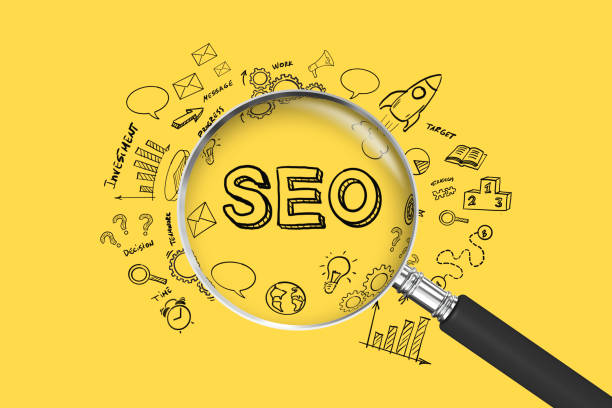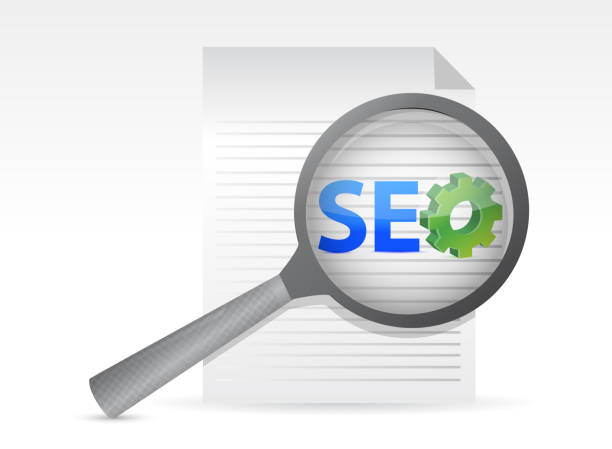What is SEO and why is it important?

What is SEO and why is it important?
SEO, or Search Engine Optimization (Search Engine Optimization), is a process that helps websites achieve a higher ranking in the search results of search engines like Google, Bing, and Yahoo.
This higher ranking means more visibility and, consequently, more traffic to the website.
More traffic typically leads to increased sales, brand recognition, and the achievement of business goals.
In today’s digital world, #search_engines play a very important role in finding information and products.
Most people use search engines to find answers to their questions, purchase products or services, and gather information about various topics.
Therefore, if your website does not rank high in search results, there is a high probability that it will not be seen by your target audience.
The importance of SEO is summarized in the following points:
- Increased Organic Traffic: A higher ranking in search results means more free traffic.
- Increased Credibility: Websites that rank high in search results appear more credible to users.
- Improved User Experience: Good SEO is usually accompanied by an improved website user experience.
- Increased ROI: SEO is a long-term investment that can yield a high return on investment.
In summary, SEO is a vital element for the success of any website in today’s digital world.
By optimizing your website for search engines, you can attract more traffic, increase your credibility, and achieve your business goals.
The SEO process is a continuous and dynamic process that requires constant review and updates to achieve the best results.
In other words, SEO is a marketing process that strives to make your website more visible in Google search results.
Is your company website performing as well as your brand deserves? In today’s competitive world, your website is your most important online tool. Rasaweb, specialists in professional corporate website design, helps you to:
✅ Gain customer trust and credibility
✅ Convert website visitors into customers
⚡ Get a free consultation!
Key SEO Fundamentals: Keywords, Link Building, and Content

Key SEO Fundamentals: Keywords, Link Building, and Content
SEO is built upon three main pillars: keywords, link building, and content.
Each of these elements plays a significant role in ranking your website in search results.
Keywords: Keywords are the terms that users enter into search engines to find the information they need.
Choosing the right keywords for your website is crucial.
You should select words that are relevant to your website’s content and are searched for by your target audience.
Keyword research involves using various tools to identify relevant keywords, checking search volume, and assessing competition for each keyword.
Using keywords in page titles, meta descriptions, and the main content of your website helps search engines understand the topic of your website.
Link Building: Link building is the process of creating links from other websites to your website.
From the perspective of search engines, links act as a vote of confidence.
The more websites that link to your website, the more authoritative you will be in the eyes of search engines.
The quality of links is also very important.
Links from reputable and relevant websites have more value.
There are various link-building techniques, including creating quality content, participating in social networks, and networking with other websites.
Content: Quality and relevant content is one of the most important factors in SEO.
Search engines look for websites that provide valuable content to users.
Your content should be engaging, informative, and up-to-date.
You should also use appropriate keywords in your content.
There are different types of content, including articles, blogs, videos, infographics, and podcasts.
In summary, successful SEO requires a combination of appropriate keywords, strong link building, and quality content.
By focusing on these three main pillars, you can improve your website’s ranking in search results and attract more traffic.
Keyword Research: Tools and Methods

Keyword Research: Tools and Methods
Keyword research is a vital process in SEO that helps you identify the words your target audience enters into search engines.
By identifying these words, you can optimize your website’s content to achieve a higher ranking in search results.
Keyword Research Tools: Various tools are available for keyword research, including:
- Google Keyword Planner: This free Google tool helps you find keywords related to your business, check search volume and competition for each keyword, and discover new keyword ideas.
- SEMrush: This paid tool allows you to analyze competitor keywords, monitor your website’s ranking for various keywords, and receive comprehensive reports on your website’s SEO performance.
- Ahrefs: This paid tool is similar to SEMrush and offers comparable features.
- Moz Keyword Explorer: This paid tool helps you find high-potential keywords, assess the ranking difficulty for each keyword, and discover new content ideas.
Keyword Research Methods: In addition to using tools, you can also employ other methods for keyword research, including:
- Brainstorming: Sit with your colleagues and compile a list of words you think your target audience might search for.
- Competitor Website Analysis: Examine the keywords that competitors use on their websites.
- Using Google Suggest: When you start typing a phrase into Google, Google shows you suggested phrases.
These phrases can be good ideas for keywords. - Checking Forums and Social Networks: See what topics your target audience discusses in forums and on social networks.
| Tool | Cost | Features |
|---|---|---|
| Google Keyword Planner | Free | Finding keywords, checking search volume, new ideas |
| SEMrush | Paid | Competitor keyword analysis, rank tracking, comprehensive reports |
| Ahrefs | Paid | Similar to SEMrush |
| Moz Keyword Explorer | Paid | Finding high-potential keywords, assessing ranking difficulty |
When choosing keywords, pay attention to search volume, competition, and the keyword’s relevance to your business.
Use a combination of head keywords and long-tail keywords.
Head keywords are short, general keywords that have high search volume but also high competition.
Long-tail keywords are long, specific keywords that have lower search volume but also less competition.
By utilizing SEO and SEO strategies, you can achieve strong marketing for your website.
On-Page SEO: Optimizing On-Page Elements

On-Page SEO: Optimizing On-Page Elements
On-page SEO refers to a set of actions taken to optimize the on-page elements of a website.
These actions help search engines better understand your website’s topic and improve your website’s ranking in search results.
Important On-Page Elements for SEO:
- Page Title: The page title is the most important element in on-page SEO.
The page title should be short, engaging, and contain the main keyword. - Meta Description: The meta description is a short summary of the page’s content that is displayed in search results.
The meta description should be engaging and persuasive and include the main keyword. - Headings: Headings are used to organize page content.
Use H1 to H6 headings to structure your content and place main keywords within the headings. - Content: Quality and relevant content is one of the most important factors in on-page SEO.
Your content should be engaging, informative, and up-to-date, and include appropriate keywords. - Images: Images should be high quality and have alternative text (alt text).
Alt text helps search engines understand the image’s topic. - Internal Links: Internal links point to other pages on your website.
Internal links help search engines understand your website’s structure and improve the ranking of different pages. - URL: The page’s URL should be short, descriptive, and contain the main keyword.
Key Tips for On-Page SEO:
- Use appropriate keywords in the page title, meta description, headings, and content.
- Produce high-quality and relevant content.
- Optimize images.
- Use internal links.
- Optimize page URLs.
- Increase page loading speed.
- Optimize your website for mobile devices.
By following these tips, you can improve your website’s on-page SEO and increase your website’s ranking in search results.
SEO is a fundamental strategy in marketing.
SEO, or search engine optimization, is a process carried out to improve the ranking of websites in search engine results like Google.
Research shows that 80% of customers trust companies with professional websites more. Does your current website inspire this trust?
With Rasaweb’s corporate website design services, permanently solve the problem of lack of customer trust and a weak online image!
✅ Create a professional image and increase customer trust
✅ Attract more sales leads and grow your business
⚡ Get a free consultation
Off-Page SEO: Link Building and Social Media

Off-Page SEO: Link Building and Social Media
Off-page SEO refers to a set of actions performed outside your website to improve your website’s ranking in search results.
The most important factors in off-page SEO are link building and social media.
Link Building: Link building is the process of creating links from other websites to your website.
From the perspective of search engines, links act as a vote of confidence.
The more websites that link to your website, the more authoritative you will be in the eyes of search engines.
The quality of links is also very important.
Links from reputable and relevant websites have more value.
There are various link-building techniques, including creating quality content, participating in social networks, and networking with other websites.
Link Building Techniques:
- Creating Quality Content: The best way to attract links is to create high-quality and valuable content.
If your content is useful and engaging, other websites will link to it. - Participating in Social Networks: By participating in social networks and sharing your content, you can create links to your website.
- Networking with Other Websites: Connect with other websites in your industry and ask them to link to your website.
- Advertising: By advertising your website on other websites, you can create links to your website.
- Creating Profiles on Other Websites: Create profiles on other websites and include your website’s link in your profile.
Social Networks: Social networks can play an important role in off-page SEO.
By sharing your content on social networks, you can attract more traffic to your website and improve your website’s ranking in search results.
Key Tips for Off-Page SEO:
- Create high-quality links.
- Be active on social networks.
- Network with other websites.
- Promote your brand online.
n
By using various SEO strategies, you can improve your position in search results.
Technical SEO: Optimizing Website Structure and Speed

Technical SEO: Optimizing Website Structure and Speed
Technical SEO refers to a set of actions taken to optimize the structure and speed of a website.
These actions help search engines better identify and index your website and improve user experience.
Important Factors in Technical SEO:
- Page Loading Speed: Page loading speed is one of the most important factors in technical SEO.
Users expect website pages to load quickly.
If your page loads slowly, users will leave your website, and your website’s ranking in search results will decrease. - Website Structure: Your website’s structure should be logical and organized.
Users and search engines should be able to easily navigate your website. - Crawlability: Search engines should be able to easily crawl your website and index all of your website’s pages.
- Mobile Compatibility: Your website should be optimized for mobile devices.
Today, most users access the internet using mobile devices. - HTTPS: Your website should use the HTTPS protocol.
HTTPS is a secure protocol that protects user information. - XML Sitemap: An XML sitemap helps search engines find all of your website’s pages.
- Robots.txt file: The robots.txt file tells search engines which pages of your website should not be crawled.
Technical SEO Tools:
- Google Search Console: This free Google tool provides you with useful information about your website’s performance in search results.
- Google PageSpeed Insights: This free Google tool checks your website’s page loading speed and provides suggestions for improvement.
- GTmetrix: This tool checks your website’s page loading speed and provides detailed information about the factors that cause slow page loading.
By optimizing your website’s structure and speed, you can improve your website’s technical SEO and increase your website’s ranking in search results.
Effective and efficient SEO can help your business thrive.
Optimizing User Experience (UX) and Its Impact on SEO

Optimizing User Experience (UX) and Its Impact on SEO
Optimizing User Experience (UX) means improving user satisfaction and contentment with your website.
Good UX makes users stay longer on your website, view more pages, and are more likely to convert into customers.
Good UX can also have a positive impact on SEO.
The Impact of UX on SEO:
- Bounce Rate: Bounce rate refers to the percentage of users who leave your website after visiting a single page without viewing other pages.
Good UX can reduce the bounce rate. - Time on Page: Time on page refers to the amount of time users spend on a single page of your website.
Good UX can increase the time on page. - Pages per Session: Pages per session refers to the number of pages users view during a single visit to your website.
Good UX can increase the number of pages per session. - Conversion Rate: Conversion rate refers to the percentage of users who perform a desired action on your website, such as purchasing a product, signing up for a newsletter, or contacting you.
Good UX can increase the conversion rate.
Factors Influencing UX:
- Visual Design: Your website’s visual design should be attractive and professional.
- Usability: Your website should be easy to use, and users should be able to easily find the information they need.
- Page Loading Speed: Your website pages should load quickly.
- Content: Your website’s content should be high-quality, relevant, and engaging.
- Mobile Compatibility: Your website should be optimized for mobile devices.
| Metric | Description | UX Impact |
|---|---|---|
| Bounce Rate | Percentage of users who leave the site after visiting one page. | Good UX reduces bounce rate. |
| Time on Page | Amount of time users spend on a page. | Good UX increases time on page. |
| Pages per Session | Number of pages users view in one session. | Good UX increases pages per session. |
| Conversion Rate | Percentage of users who perform a desired action. | Good UX increases conversion rate. |
By optimizing your website’s UX, you can increase user satisfaction, improve conversion rates, and boost your website’s ranking in search results.
SEO combined with UX can drive more users to your website.
Local SEO: Attracting Regional Customers

Local SEO: Attracting Regional Customers
Local SEO refers to a set of actions taken to optimize your website for local searches.
Local SEO helps local businesses get found in the search results of users located in their geographic area.
SEO optimization helps users easily find their local businesses.
Importance of Local SEO:
- Attracting Regional Customers: Local SEO helps you attract customers who are in your geographic area and are looking for your products or services.
- Increasing Brand Awareness: Local SEO helps you increase your brand awareness in your geographic area.
- Competing with Large Businesses: Local SEO helps you compete with large businesses operating nationally.
Important Factors in Local SEO:
- Google My Business: Creating and optimizing your Google My Business page is one of the most important factors in local SEO.
On your Google My Business page, provide accurate information about your business, such as name, address, phone number, operating hours, and business description. - Using Local Keywords: Use local keywords in your website content, such as the name of your city, region, and neighborhood.
- Local Link Building: Obtain links from local websites.
- Customer Reviews: Ask your customers to post their reviews on your Google My Business page.
- Mobile Compatibility: Your website should be optimized for mobile devices.
Local SEO Tools:
- Google My Business
- Moz Local
- BrightLocal
- Yext
By optimizing your website for local searches, you can attract more customers, increase your brand awareness, and compete with large businesses.
Using SEO to attract local customers is an effective strategy.
Are you tired of your e-commerce site getting visitors but no sales? Rasaweb solves your main problem with professional e-commerce website design!
✅ Significantly increase sales with targeted design
✅ Flawless user experience for your customers
⚡ Get a free consultation!
Measuring and Analyzing SEO: Metrics and Tools

Measuring and Analyzing SEO: Metrics and Tools
Measuring and analyzing SEO helps you evaluate your website’s SEO performance and identify its strengths and weaknesses.
By measuring and analyzing SEO, you can improve your SEO strategy and achieve better results.
Important Metrics in SEO Measurement:
- Organic Traffic: Organic traffic refers to traffic that comes to your website through search engine results.
Organic traffic is one of the most important metrics in SEO. - Keyword Ranking: Keyword ranking refers to your website’s position in search engine results for specific keywords.
Keyword ranking shows for which keywords your website ranks high in search results. - Bounce Rate
- Time on Page
- Pages per Session
- Conversion Rate
- Links: The number and quality of links pointing to your website indicate your website’s authority from the perspective of search engines.
SEO Measurement and Analysis Tools:
- Google Analytics: This free Google tool provides you with comprehensive information about your website’s traffic.
- Google Search Console: This free Google tool provides you with useful information about your website’s performance in search results.
- SEMrush
- Ahrefs
- Moz Pro
By using these tools and metrics, you can measure and analyze your website’s SEO performance and improve your SEO strategy.
Keep in mind that SEO is a dynamic process.
SEO is an ongoing process that requires continuous review and updates.
Keeping up with the latest changes in search engine algorithms is an important principle.
The Future of SEO: Trends and Predictions

The Future of SEO: Trends and Predictions
SEO is a dynamic field that is constantly changing.
With changes in search engine algorithms and evolving user behavior, SEO strategies must also adapt.
In this section, we will explore some of the trends and predictions related to the future of SEO.
Important Trends in SEO:
- Artificial Intelligence (AI): AI is changing how search engines operate.
Search engines use AI to better understand website content, identify spam, and deliver more relevant search results. - Voice Search: Voice search is on the rise.
Users are increasingly using voice assistants like Siri, Alexa, and Google Assistant to search for information. - User Experience (UX): User experience will continue to be an important factor in SEO.
Search engines give higher rankings to websites that provide a good user experience. - Video Content: Video content is becoming more popular.
Users are increasingly using videos to get information and for entertainment. - Local SEO: Local SEO will continue to be important for local businesses.
Predictions for the Future of SEO:
- SEO will become more complex. With changes in search engine algorithms and the emergence of new technologies, SEO will become more complex and require more expertise.
- AI will play a more significant role in SEO. AI will help search engines better understand website content and deliver more relevant search results.
- User experience will become even more important. Search engines will give higher rankings to websites that provide a good user experience.
- Video content will gain more importance. Video content will become a significant format for SEO.
To succeed in SEO in the future, you must be familiar with these trends and predictions and adjust your SEO strategy accordingly. Forward-thinking SEO, using the latest SEO methods, can solidify your website’s position.
Frequently Asked Questions
| Question | Answer |
|---|---|
| What is SEO? | SEO, or Search Engine Optimization, is a process for increasing the quality and quantity of website traffic by improving the site’s ranking in organic search results of search engines like Google. |
| What are the main types of SEO? | SEO is divided into three main categories: On-Page SEO, Off-Page SEO, and Technical SEO. |
| What does On-Page SEO include? | On-Page SEO includes optimizing elements within the website, such as keywords, Title Tags, Meta Descriptions, content, URL structure, images, and internal links. |
| What is Off-Page SEO? | Off-Page SEO refers to activities outside the website that help improve its ranking, such as Backlink Building, social media marketing, and Brand Mentions. |
| What is Technical SEO? | Technical SEO involves optimizing the technical aspects of a website to help it be better crawled and indexed by search engines. This includes site speed, mobile-friendliness, site structure, Sitemaps, and the Robots.txt file. |
| What role do Keywords play in SEO? | Keywords are phrases that users enter into search engines. Proper and targeted use of relevant keywords in content and site elements helps search engines understand your page’s topic and display it for relevant searches. |
| What is a Backlink and why is it important? | A backlink, or inbound link, is a link from one website to another. Backlinks act as a “vote of confidence” from other sites for search engines and play an important role in the credibility and ranking increase of a site, especially if they are from reputable sites. |
| What impact does quality content have on SEO? | Quality, relevant, comprehensive, and unique content not only attracts and retains users but also shows search engines that your page is valuable. This helps improve ranking, reduce Bounce Rate, and increase user time on site. |
| Why is site loading speed important for SEO? | Site loading speed is an important ranking factor for Google. Faster sites provide a better user experience, have lower bounce rates, and are preferred by search engines. |
| Is SEO a one-time process? | No, SEO is a continuous and long-term process. Search engine algorithms are constantly changing, competition is increasing, and site content also needs updating. Therefore, SEO requires continuous monitoring, analysis, and optimization. |
And other services of Rasa Web advertising agency in the field of advertising
- Smart Digital Advertising: An innovative service for increasing website traffic through the use of real data.
- Smart Marketing Automation: A professional solution for increasing website traffic with a focus on customizing user experience.
- Smart Link Building: Professional optimization for campaign management using attractive UI design.
- Smart Reportage: A fast and efficient solution for increasing website traffic with a focus on Google Ads management.
- Smart Data Analysis: A dedicated service for growing website traffic based on intelligent data analysis.
And over hundreds of other services in the field of internet advertising, advertising consulting, and organizational solutions.
Internet Advertising | Advertising Strategy | Advertorial
Sources
Comprehensive SEO Guide 2024
SEO 2024: Key Techniques
What is SEO and How it Works
SEO Training 2024
? Are you ready for your business to shine in the digital space? Rasaweb Afarin, by providing comprehensive digital marketing services including corporate website design, SEO, and social media management, paves the way for your success.
📍 Tehran, Mirdamad Street, next to Bank Markazi, Kazeroun Jonoubi Alley, Ramin Alley, No. 6




